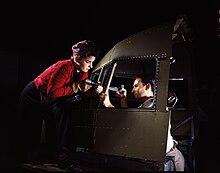United States Office of War Information
| OWI | |
 Riveting team working on the cockpit shell of a C-47 cargo plane at the plant of North American Aviation |
|
| Agency overview | |
|---|---|
| Formed | June 13, 1942 |
| Preceding agencies | |
| Dissolved | September 15, 1945 |
| Superseding agencies |
|
| Jurisdiction | United States Government |
| Headquarters | Washington, D.C. |
| Parent agency | Office for Emergency Management |
| Child agencies |
|
The United States Office of War Information (OWI) was a United States government agency created during World War II to consolidate existing government information services and deliver propaganda both at home and abroad. OWI operated from June 1942 until September 1945. Through radio broadcasts, newspapers, posters, photographs, films and other forms of media, the OWI was the connection between the battlefront and civilian communities. The office also established several overseas branches, which launched a large-scale information and propaganda campaign abroad.
President Franklin D. Roosevelt promulgated the OWI on June 13, 1942 by Executive Order 9182 to consolidate the functions of the Office of Facts and Figures (OWI's direct predecessor), the Office of Government Reports, and the Division of Information of the Office for Emergency Management. The Foreign Information Service, a division of the Office of the Coordinator of Information, became the core of the Overseas Branch of the OWI.
At the onset of World War II, the American public was in the dark regarding wartime information. One American observer noted: “It all seemed to boil down to three bitter complaints…first, that there was too much information; second, that there wasn’t enough of it; and third, that in any event it was confusing and inconsistent”. Further, the American public confessed a lack of understanding as to why the world was at war, and held great resentment against other Allied Nations. President Roosevelt established the OWI to both meet the demands for news and less confusion, as well as resolve American apathy towards the war.
The OWI’s creation was not without controversy. The American public, and the United States Congress in particular, were wary of propaganda for several reasons. First, the press feared a centralized agency as the sole distributor of wartime information. Second, Congress feared an American propaganda machine that could resemble Joseph Goebbels’ operation in Nazi Germany. Third, previous attempts at propaganda under the Committee on Public Information/Creel Committee during WWI were viewed as a failure. And fourth, America was experiencing endemic isolationism and was hesitant to become involved in a global propaganda campaign and subsequently a global war.
...
Wikipedia
